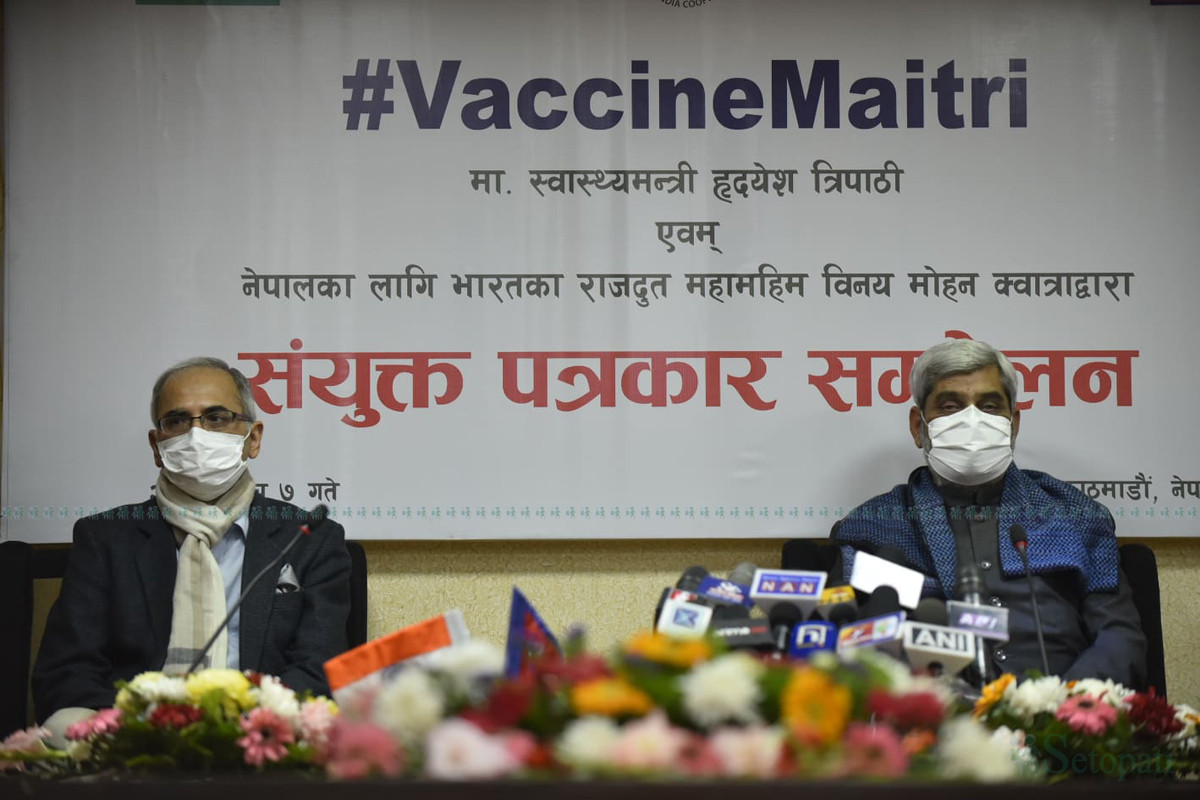India will provide a million doses of COVID-19 vaccines to Nepal in grant.
Health Minister Hridayesh Tripathi and Indian Ambassador to Nepal Vinay Mohan Kwatra organizing a joint press conference on Wednesday informed that the vaccines will arrive here on Thursday.
India has started to dispatch vaccines to neighboring countries from Wednesday starting with Bhutan and Maldives. It will send to Bangladesh and Nepal on Thursday, and Myanmar and Seychelles on Friday, according to the Indian media.
The vaccines coming from India will first be given to health professionals and others working on the front line.
The government on January 15 had granted emergency use authorization for Covishield vaccine manufactured by Serum Institute of India.
Foreign Minister Pradeep Gyawali had also discussed the issue of vaccine with Indian government officials during his India visit last week.
A meeting of the Department of Drug Administration had granted emergency use authorization for Covishield making the Indian vaccine the first to get any kind of permission in Nepal.
The vaccine is developed by the company in coordination with the Oxford University.
The government has already given permission to private companies to import COVID-19 vaccines and emergency use authorization for Covishield is expected to expedite the process.
Indian Foreign Ministry spokesman Anurag Srivastava, meanwhile, said in New Delhi that the government would ensure that domestic vaccine makers have adequate stocks to meet India’s domestic needs as it supplies partner countries in the coming months.
“India will continue to supply countries all over the world with vaccines. This will be calibrated against domestic requirements and international demand and obligations,” he said.
Indian regulators gave the nod for emergency use to two vaccines earlier this month: the AstraZeneca vaccine and another one by Indian vaccine maker Bharat Biotech. India kicked off its own massive vaccination drive on Jan. 17, with a goal of inoculating 300 million of its nearly 1.4 billion people.
These vaccines being sent to neighboring countries are being sent as grants and India’s Foreign Ministry said the vaccines were not part of COVAX, the U.N.-backed global effort aimed at helping lower income countries obtain the shots.
With nations making their own plans and not waiting for COVAX, some experts fear that India’s gesture of goodwill may inadvertently undermine the struggling initiative, which has yet to deliver any of the promised 2 billion vaccines to poor countries. Although COVAX has announced new deals to secure vaccines in recent weeks, it has only signed legally binding deals for a fraction of the needed shots.
WHO said earlier this week it hopes vaccines bought by another global initiative started by the Gates Foundation, GAVI, might start being delivered to poor countries later this month or next. The U.N. health agency’s Africa chief, however, estimated that the first COVID-19 vaccines from that initiative might only arrive in March and that a larger roll-out would only begin in June.
Of the more than 12 billion coronavirus vaccine doses being produced this year, rich countries have already bought about 9 billion, and many have options to buy even more. This means that Serum Institute, which has been contracted by AstraZeneca to make a billion doses, is likely to make most of the shots that’ll be used by developing nations.

